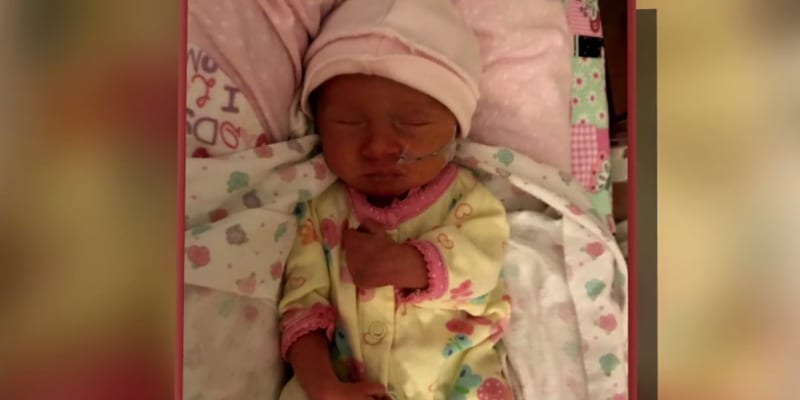Ruby Eekoff nearly became a tragic statistic. Thanks to a simple smartphone app, she is a happy and healthy baby settling into Life with parents Jeremy and Emily and older brother, Liam. The family appeared on Good Morning America to share Ruby’s amazing birth story.
Emily downloaded the free app Count the Kicks, which was designed to help mothers track their babies’ activity level in the third trimester of pregnancy. The app sends a reminder for moms to count the number of movements in a ten-minute period at the same time every day. By collecting the data, mothers learn the usual activity level for their preborn child and may notice if the pattern changes.
In Ruby’s case, the number of movements changed dramatically one day when Emily was 33-weeks pregnant. Emily noticed the sharp decline in movement and felt a change in the quality of the kicks. She told Good morning America, “When she did move, it was really soft and—not hard, like normal.” Emily had been tracking Ruby’s movement since 28 weeks, so she had a record of Ruby’s normal activity. The family was concerned about the changes and headed to the hospital.
Shortly after, Ruby was born in an emergency caesarian section. Doctors had discovered that Ruby’s umbilical cord had wrapped around her three times, constricting her movement and possibly endangering her Life. Ruby’s family is overjoyed by her birth and credit the app with saving her Life.
The group behind Count the Kicks was founded by five mothers grieving daughters lost to stillbirth or early infant loss. The women formed a bond and decided to channel their grief into stillbirth awareness and prevention. They launched the Count the Kicks app after learning that teaching women to perform movement counts in the third trimester reduced one hospital’s stillbirth rate by 30 percent. Keeping track of movement is a simple way for mothers to assess their babies’ well-being in the weeks leading up to birth.
Count the Kicks, along with the many other pregnancy apps available, are a powerful way of connecting mothers to the Life growing within them. The apps also reveal the humanity of the preborn by including extensive information about growth and development, which shows preborn babies are anything but a random “clump of cells.” Pregnancy Help News noted that even Good Morning America’s women’s health correspondent Dr. Jennifer Ashton accidentally humanized preborn babies by referring to the “baby’s” movement in the segment following Ruby’s story. Ashton, who is a fellow with the anti-Life American College of Obstetricians and Gynecologists, quickly stopped herself and referred to the baby as a “fetus.”
Despite her anti-Life bias, Ashton did include an important and compassionate footnote to the story. She applauded the app for saving Ruby’s Life and raising awareness, but cautioned that the cause of most stillbirths is unknown. Although the app, which has been downloaded more than 5,000 times since Ruby’s amazing story, may help save other lives and be a positive way for mothers to check in with their babies, the app is not a complete solution. Mothers who suffer the heartbreaking tragedy of stillbirth should not mistakenly feel that they are responsible or that there is anything they could have done to save their precious babies.
For now, we celebrate the joy-filled birth of Ruby. Her story shows that simple tools that help mothers bond with their preborn babies can have powerful, life-saving results.


